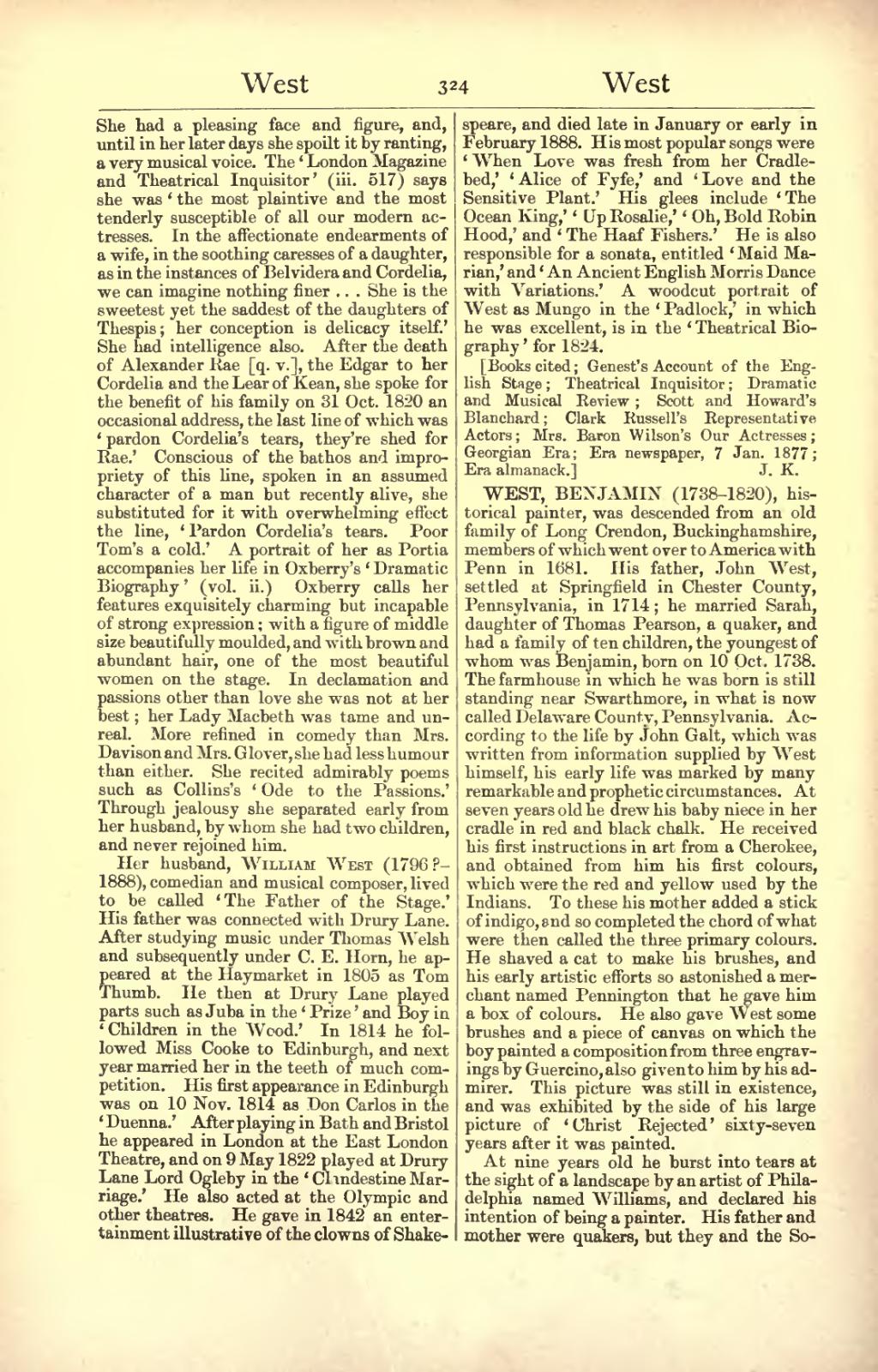She had a pleasing face and figure, and, until in her later days she spoilt it by ranting, a very musical voice. The ‘London Magazine and Theatrical Inquisitor’ (iii. 517) says she was ‘the most plaintive and the most tenderly susceptible of all our modern actresses. In the affectionate endearments of a wife, in the soothing caresses of a daughter, as in the instances of Belvidera and Cordelia, we can imagine nothing finer … She is the sweetest yet the saddest of the daughters of Thespis; her conception is delicacy itself.’ She had intelligence also. After the death of Alexander Rae [q. v.], the Edgar to her Cordelia and the Lear of Kean, she spoke for the benefit of his family on 31 Oct. 1820 an occasional address, the last line of which was ‘pardon Cordelia's tears, they're shed for Rae.’ Conscious of the bathos and impropriety of this line, spoken in an assumed character of a man but recently alive, she substituted for it with overwhelming effect the line, ‘Pardon Cordelia's tears. Poor Tom's a cold.’ A portrait of her as Portia accompanies her life in Oxberry's ‘Dramatic Biography’ (vol. ii.). Oxberry calls her features exquisitely charming but incapable of strong expression; with a figure of middle size beautifully moulded, and with brown and abundant hair, one of the most beautiful women on the stage. In declamation and passions other than love she was not at her best; her Lady Macbeth was tame and unreal. More refined in comedy than Mrs. Davison and Mrs. Glover, she had less humour than either. She recited admirably poems such as Collins's ‘Ode to the Passions.’ Through jealousy she separated early from her husband, by whom she had two children, and never rejoined him.
Her husband, William West (1796?–1888), comedian and musical composer, lived to be called ‘The Father of the Stage.’ His father was connected with Drury Lane. After studying music under Thomas Welsh and subsequently under C. E. Horn, he appeared at the Haymarket in 1805 as Tom Thumb. He then at Drury Lane played parts such as Juba in the ‘Prize’ and Boy in ‘Children in the Wood.’ In 1814 he followed Miss Cooke to Edinburgh, and next year married her in the teeth of much competition. His first appearance in Edinburgh was on 10 Nov. 1814 as Don Carlos in the ‘Duenna.’ After playing in Bath and Bristol he appeared in London at the East London Theatre, and on 9 May 1822 played at Drury Lane Lord Ogleby in the ‘Clandestine Marriage.’ He also acted at the Olympic and other theatres. He gave in 1842 an entertainment illustrative of the clowns of Shakespeare, and died late in January or early in February 1888. His most popular songs were ‘When Love was fresh from her Cradle-bed,’ ‘Alice of Fyfe,’ and ‘Love and the Sensitive Plant.’ His glees include ‘The Ocean King,’ ‘Up Rosalie,’ ‘Oh, Bold Robin Hood,’ and ‘The Haaf Fishers.’ He is also responsible for a sonata, entitled ‘Maid Marian,’ and ‘An Ancient English Morris Dance with Variations.’ A woodcut portrait of West as Mungo in the ‘Padlock,’ in which he was excellent, is in the ‘Theatrical Biography’ for 1824.
[Books cited; Genest's Account of the English Stage; Theatrical Inquisitor; Dramatic and Musical Review; Scott and Howard's Blanchard; Clark Russell's Representative Actors; Mrs. Baron Wilson's Our Actresses; Georgian Era; Era newspaper, 7 Jan. 1877; Era almanack.]
WEST, BENJAMIN (1738–1820), historical painter, was descended from an old family of Long Crendon, Buckinghamshire, members of which went over to America with Penn in 1681. His father, John West, settled at Springfield in Chester County, Pennsylvania, in 1714; he married Sarah, daughter of Thomas Pearson, a quaker, and had a family of ten children, the youngest of whom was Benjamin, born on 10 Oct. 1738. The farmhouse in which he was born is still standing near Swarthmore, in what is now called Delaware County, Pennsylvania. According to the life by John Galt, which was written from information supplied by West himself, his early life was marked by many remarkable and prophetic circumstances. At seven years old he drew his baby niece in her cradle in red and black chalk. He received his first instructions in art from a Cherokee, and obtained from him his first colours, which were the red and yellow used by the Indians. To these his mother added a stick of indigo, and so completed the chord of what were then called the three primary colours. He shaved a cat to make his brushes, and his early artistic efforts so astonished a merchant named Pennington that he gave him a box of colours. He also gave West some brushes and a piece of canvas on which the boy painted a composition from three engravings by Guercino, also given to him by his admirer. This picture was still in existence, and was exhibited by the side of his large picture of ‘Christ Rejected’ sixty-seven years after it was painted.
At nine years old he burst into tears at the sight of a landscape by an artist of Philadelphia named Williams, and declared his intention of being a painter. His father and mother were quakers, but they and the So-
